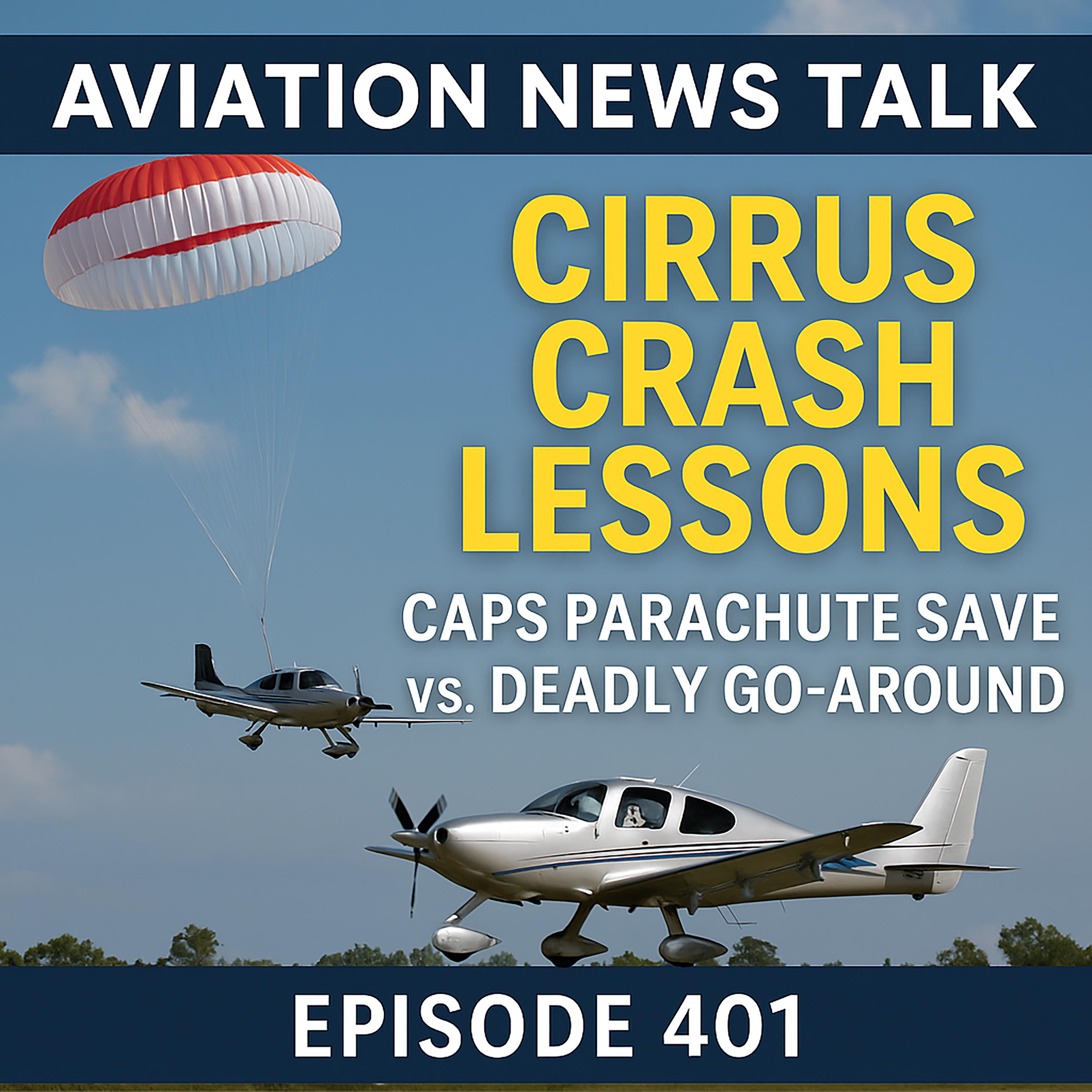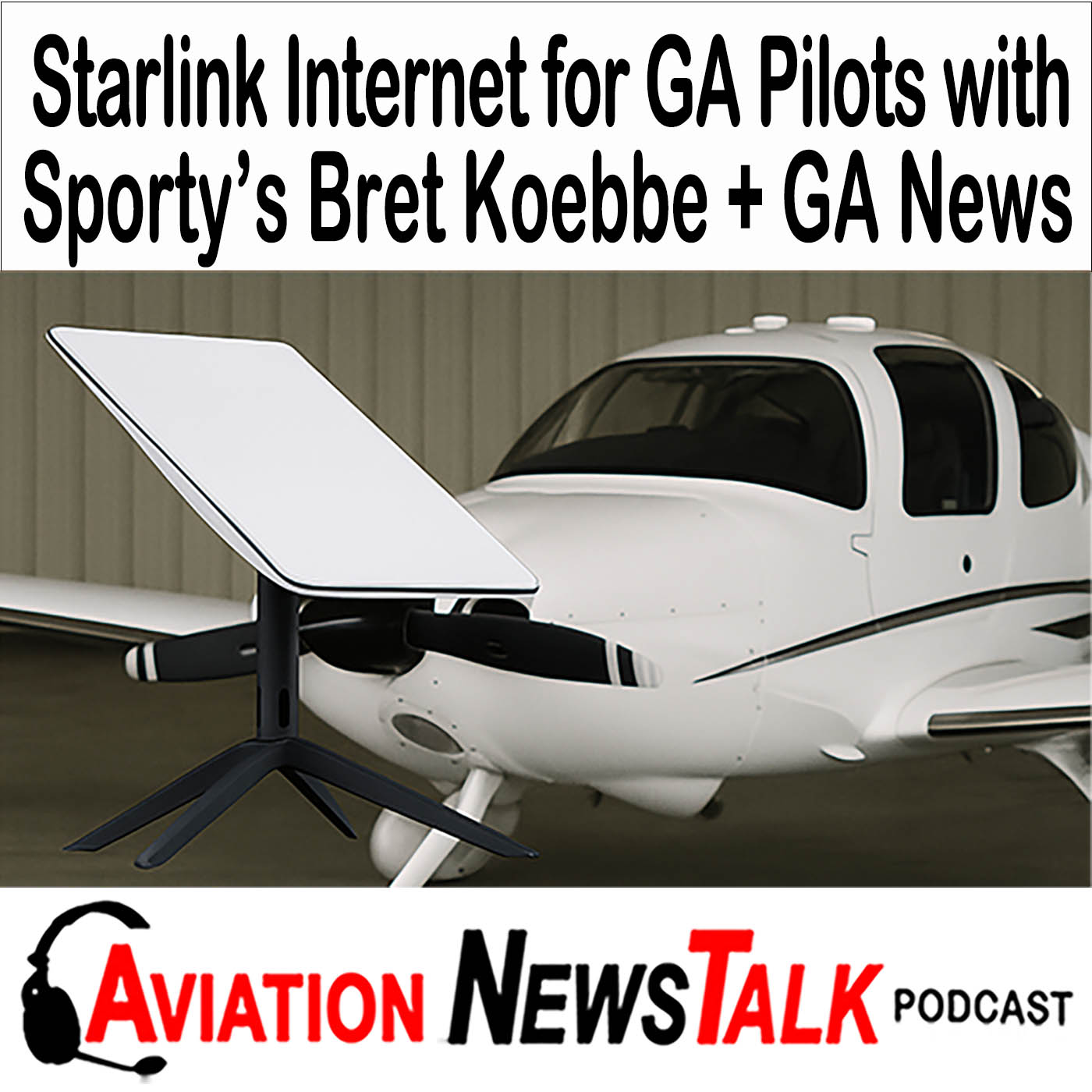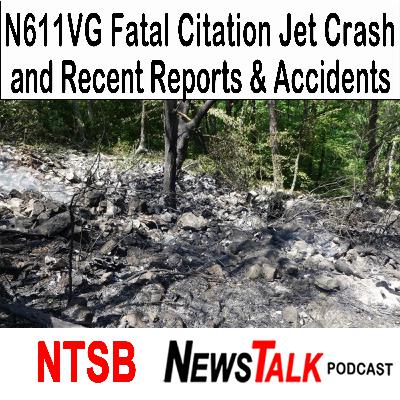401 Cirrus Crash Lessons: CAPS Parachute Save vs. Deadly Go-Around + GA News
Description
Max talks with John Fiscus of The Flight Academy to break down two Cirrus SR22 accidents that highlight the extremes of safety outcomes in general aviation: one a dramatic survival story, the other a heartbreaking tragedy.
<figure class="wp-block-image">
 </figure>
</figure>
Accident 1: CAPS Parachute Save over Lake Michigan
The first accident involved a Cirrus SR22 (N121JB) that suffered engine failure shortly after reaching 7,500 feet on a flight across Lake Michigan. The pilot and passengers had life vests ready, immediately turned toward shore, declared a mayday, and deployed the Cirrus Airframe Parachute System (CAPS). The parachute brought the aircraft down safely into the cold waters, where the occupants were rescued by the Coast Guard.
This outcome underscores why CAPS has become one of Cirrus’s most powerful safety innovations. John emphasizes lessons from the accident:
- Always wear flotation gear before flying over large bodies of water.
- Be cautious of low-time airplanes—this Cirrus had only 75 hours in four years, raising concerns about engine reliability.
- Understand the “unwritten rule”: don’t fly beyond gliding distance over the Great Lakes, where hypothermia makes ditching survival unlikely.
Accident 2: Fatal Go-Around at Franklin County Airport, NC
The second case involved a Cirrus SR22 Turbo (N218VB) attempting to land at Franklin County Airport in North Carolina. Weather was clear, but the pilot approached high, fast, and tight, leaving little margin for error. After abandoning the first landing attempt, the pilot tried again but remained unstable. On the second approach, the aircraft descended steeply and attempted a go-around, which ended in a fatal crash.
John and Max discuss common contributing factors in go-around accidents:
- Unstable approaches with excessive speed and descent rates.
- Turbocharged engine management—if the mixture isn’t properly enriched, adding full power can cause the engine to stumble or quit.
- Rudder discipline—failure to apply right rudder is a leading cause of go-around crashes, often resulting in wreckage on the left side of the runway.
- Lack of practice—many pilots avoid go-arounds, leaving them unprepared for the demands of the maneuver.
Both accidents reinforce the importance of:
- Standard Operating Procedures (SOPs): Airline pilots succeed not because they’re inherently better, but because they follow strict procedures. GA pilots should do the same.
- Go-Around Training: Every pilot should regularly practice stabilized go-arounds under realistic conditions.
- CAPS Awareness: The parachute system consistently saves lives when used promptly.
- Risk Assessment: Whether crossing lakes or approaching mountainous airports, risk should be mitigated through planning, equipment, and training.
By contrasting a successful CAPS deployment with a tragic go-around accident, this episode drives home the reality that survival often comes down to preparation, discipline, and knowing how to use the tools available.
For Cirrus and general aviation pilots alike, this is an essential conversation on accident prevention, go-around safety, and maximizing the life-saving potential of CAPS.
If you're getting value from this show, please support the show via PayPal, Venmo, Zelle or Patreon.
Support the Show by buying a Lightspeed ANR Headsets
Max has been using only Lightspeed headsets for nearly 25 years! I love their tradeup program that let's you trade in an older Lightspeed headset for a newer model. Start with one of the links below, and Lightspeed will pay a referral fee to support Aviation News Talk.
Lightspeed Delta Zulu Headset $1299
NEW – Lightspeed Zulu 4 Headset $1099
Lightspeed Zulu 3 Headset $949
Lightspeed Sierra Headset $749
My Review on the Lightspeed Delta Zulu
Send us your feedback or comments via email
If you have a question you’d like answered on the show, let listeners hear you ask the question, by recording your listener question using your phone.
News Stories
- Flight instructor pleads guilty in plane crash that killed student pilot
- Three Killed in Michigan Jet Crash
- Pilot inadvertently retracts landing gear when he meant to retract flaps
- Student hits fuel truck
- Charter pilots sought for automation study
- Pilot focuses on open engine cover and too little on flying the airplane
- SR22 pilot runs out of fuel and pulls CAPS
- Pilot crashes while planning out his own runway
- Balloon Smashed The Cockpit Window Of a United Airlines Boeing 737MAX
Mentioned on the Show
Buy Max Trescott's G3000 Book Call 800-247-6553
Lightspeed Delta Zulu Headset Giveaway
NTSB News Talk Podcast
UAV News Talk Podcast
Rotary Wing Show Podcast
Buy ForeFlight Sentry ADS-B Receiver
Max’s FLYING article on Potomac MidAir Collision
The Flight Academy
Free Index to the first 282 episodes of Aviation New Talk
So You Want To Learn to Fly or Buy a Cirrus seminars
Online Version of the Seminar Coming Soon – Register for Notification
Check out our recommended ADS-B receivers, and order one for yourself. Yes, we’ll make a couple of dollars if you do.
Get the Free Aviation News Talk app for iOS or Android.
Check out Max’s Online Courses: G1000 VFR, G1000 IFR, and Flying WAAS & GPS Approaches. Find them all at: https://www.pilotlearning.com/
Social Media
Like Aviation News Talk podcast on Facebook
Follow Max on Instagram
Follow Max on Twitter
Listen to all Aviation News Talk podcasts on YouTube or YouTube Pre
























